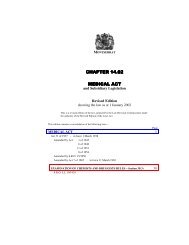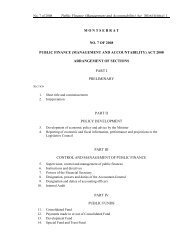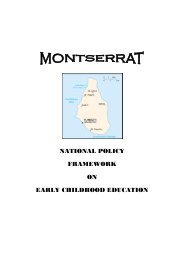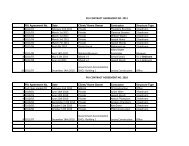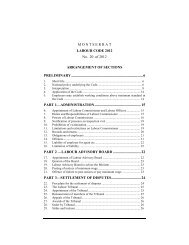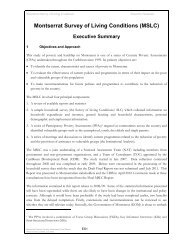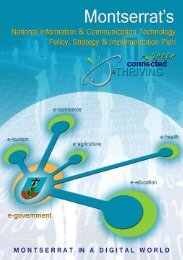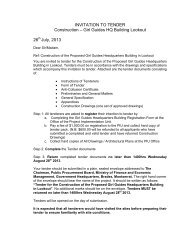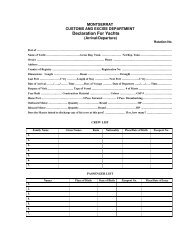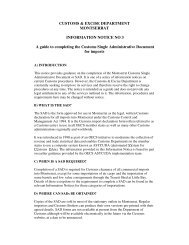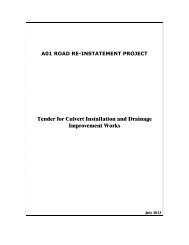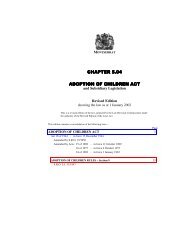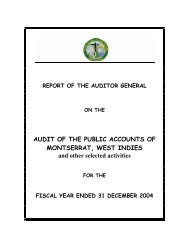Trust Act - Financial Services Commission Montserrat
Trust Act - Financial Services Commission Montserrat
Trust Act - Financial Services Commission Montserrat
Create successful ePaper yourself
Turn your PDF publications into a flip-book with our unique Google optimized e-Paper software.
MONTSERRAT<br />
CHAPTER 11.06<br />
TRUST ACT<br />
Revised Edition<br />
showing the law as at 1 January 2002<br />
This is a revised edition of the law, prepared by the Law Revision <strong>Commission</strong>er under<br />
the authority of the Revised Edition of the Laws <strong>Act</strong>.<br />
This edition contains a consolidation of the following laws—<br />
Page<br />
TRUST ACT 3<br />
<strong>Act</strong> 19 of 1998 .. in force 17 January 2000 (S.R.O. 8/2000)
MONTSERRAT<br />
CHAPTER 11.06<br />
TRUST ACT<br />
Revised Edition<br />
showing the law as at 1 January 2002<br />
This is a revised edition of the law, prepared by the Law Revision <strong>Commission</strong>er under<br />
the authority of the Revised Edition of the Laws <strong>Act</strong>.<br />
This edition contains a consolidation of the following laws—<br />
Page<br />
TRUST ACT 3<br />
<strong>Act</strong> 19 of 1998 .. in force 17 January 2000 (S.R.O. 8/2000)
LAWS OF<br />
MONTSERRAT<br />
Revision Date: 1 Jan 2002<br />
<strong>Trust</strong> CAP. 11.06 3<br />
CHAPTER 11.06<br />
TRUST ACT<br />
ARRANGEMENT OF SECTIONS<br />
SECTION<br />
1. Short title<br />
PART I<br />
PRELIMINARY<br />
2. Definitions<br />
3. <strong>Trust</strong>s described<br />
PART II<br />
4. Jurisdiction of court<br />
JURISDICTION AND POWERS OF COURT<br />
PART III<br />
CREATION OF TRUSTS<br />
5. Creation of trusts<br />
6. Validity of trust<br />
7. Presumption against avoidance of trust<br />
8. Duration of trust and accumulation of income<br />
9. Proper law of trust<br />
PART IV<br />
PROTECTORS AND TRUSTEES<br />
10. Protector<br />
11. Who may be trustee<br />
12. Court appointed protector<br />
13. Appointment of new or additional trustee<br />
14. Appointment of resident trustee<br />
15. Renunciation of <strong>Trust</strong>eeship<br />
16. Resignation or removal of trustees
4 CAP. 11.06 <strong>Trust</strong><br />
LAWS OF<br />
MONTSERRAT<br />
Revision Date: 1 Jan 2002<br />
17. Nature of interests<br />
18. Corporate trustee by resolution<br />
19. <strong>Trust</strong>ees of more than one trust<br />
20. Dealing with third parties<br />
PART V<br />
21. Charitable trusts<br />
CHARITABLE TRUSTS<br />
PART VI<br />
22. Interpretation<br />
23. Creation of purpose trusts<br />
24. Custody of copy of instrument<br />
25. Extension of cy-pres<br />
PURPOSE TRUSTS<br />
PART VII<br />
26. Interpretation<br />
27. Exclusion of foreign law<br />
28. Capacity of settlor<br />
FOREIGN ELEMENTS LAW<br />
PART VIII<br />
29. Variant types of trust<br />
30. Provision of variant types<br />
VARIANT TYPES OF TRUST<br />
PART IX<br />
DUTIES AND POWERS OF TRUSTEES<br />
31. General duties of trustees<br />
32. Duty to supply information and confidentiality<br />
33. Duty of trustees to act together<br />
34. Duty to act impartially<br />
35. General power of trustees
LAWS OF<br />
MONTSERRAT<br />
Revision Date: 1 Jan 2002<br />
<strong>Trust</strong> CAP. 11.06 5<br />
36. Powers of investment<br />
37. Implied powers of trustees<br />
38. Delegation by trustees<br />
39. Reimbursement of expenses<br />
40. Payment of trustees<br />
41. Power to appropriate<br />
42. Power and duty of maintenance<br />
43. Power of advancement<br />
44. Accumulation and maintenance settlements<br />
45. Receipts of parents and guardians<br />
46. Power of appointment<br />
47. Power of revocation or variation<br />
48. Protective trusts<br />
PART X<br />
VARIATION OF TRUST<br />
49. Variation of trusts<br />
50. Approval of particular transaction<br />
PART XI<br />
51. Language of trusts<br />
52. Confidentiality<br />
53. Income Tax<br />
54. Repealed<br />
55. Non-application of <strong>Act</strong><br />
56. Application of other law<br />
57. Optional registration<br />
SCHEDULES<br />
MISCELLANEOUS
LAWS OF<br />
MONTSERRAT<br />
Revision Date: 1 Jan 2002<br />
<strong>Trust</strong> CAP. 11.06 7<br />
CHAPTER 11.06<br />
TRUST ACT<br />
(<strong>Act</strong> 19 of 1998)<br />
AN ACT TO MAKE PROVISION FOR THE LAW OF TRUSTS AND TRUSTEES AND<br />
FOR RELATED MATTERS.<br />
Commencement<br />
[17 January 2000]<br />
Short title<br />
1. This <strong>Act</strong> may be cited as the <strong>Trust</strong> <strong>Act</strong>.<br />
PART I<br />
PRELIMINARY<br />
Definitions<br />
2. (1) In this <strong>Act</strong>—<br />
(a) “accountant” has the same meaning as in section 2 of the<br />
Company Management <strong>Act</strong>;<br />
(b) “beneficiary” includes—<br />
(i) an exempt insurance company within the meaning of the<br />
Exempt Insurance <strong>Act</strong>;<br />
(ii) an off-shore bank within the meaning of the Offshore<br />
Banking <strong>Act</strong>;<br />
(iii) an international business company within the meaning of<br />
the International Business Companies <strong>Act</strong>; and<br />
(iv) a charitable institution resident in <strong>Montserrat</strong>;<br />
(c) “court” means the High Court;<br />
(d) “designated person” means an accountant, attorney-at-law,<br />
a trust corporation, a licensee under the Offshore Banking<br />
<strong>Act</strong> or such other person as the Governor may designate<br />
under subsection (2);<br />
(e) “exempt trust” means a trust in respect of which—
8 CAP. 11.06 <strong>Trust</strong><br />
LAWS OF<br />
MONTSERRAT<br />
Revision Date: 1 Jan 2002<br />
(i) the settlor is resident outside <strong>Montserrat</strong> at the time of<br />
the creation of the trust and at such times as the settlor<br />
adds new property to the trust;<br />
(ii) at least one of the trustees is a company licensed to do<br />
banking business under the Offshore Banking <strong>Act</strong> or a<br />
trust corporation;<br />
(iii) no beneficiary, other than a person set out in paragraph<br />
(b), is a resident of <strong>Montserrat</strong>; and<br />
(iv) the trust property does not include any immovable<br />
property situate in <strong>Montserrat</strong> or an interest in any<br />
property so situate;<br />
(f) “trust corporation” means a company incorporated or<br />
registered under the Companies <strong>Act</strong> for the purpose of<br />
managing trusts.<br />
(2) The Governor may designate any person whom he considers<br />
suitable to be a trustee of an exempt trust for the purposes of this <strong>Act</strong>.<br />
<strong>Trust</strong>s described<br />
3. (1) In this <strong>Act</strong> the expression “trust” means the legal relationship<br />
created when assets have been placed under the control of a trustee for the<br />
benefit of a beneficiary or for a specified purpose.<br />
(2) A trust has the following characteristics—<br />
(a) the assets of the trust constitute a separate fund and are not a<br />
part of the trustees’ own estate;<br />
(b) title to the assets of the trust are held in the name of the<br />
trustee or in the name of another person on behalf of the<br />
trustee;<br />
(c) the trustee has the power and the duty to manage, employ or<br />
dispose of the assets of the trust in accordance with the terms<br />
thereof and the special duties imposed upon by him by law;<br />
and<br />
(d) the trustee is accountable for the management and<br />
administration of the assets of the trust.<br />
PART II<br />
JURISDICTION AND POWERS OF COURT<br />
Jurisdiction of court<br />
4. The court has jurisdiction in respect of any matter concerning a<br />
trust—
LAWS OF<br />
MONTSERRAT<br />
Revision Date: 1 Jan 2002<br />
<strong>Trust</strong> CAP. 11.06 9<br />
(a) where the proper law of the trust is the law of <strong>Montserrat</strong>; or<br />
(b) where a trustee of the trust is resident in <strong>Montserrat</strong>; or<br />
(c) where any property of the trust is situate in <strong>Montserrat</strong>, but<br />
only in respect of the property so situate; or<br />
(d) where any part of the administration of the trust is carried on<br />
in <strong>Montserrat</strong>.<br />
PART III<br />
CREATION OF TRUSTS<br />
Creation of trusts<br />
5. (1) A trust other than an exempt trust may be created by oral<br />
declaration or by an instrument in writing (including a will or codicil) by<br />
conduct, or operation of law.<br />
(2) An exempt trust may only be created by instrument in writing.<br />
(3) A trust other than a trust by operation of law respecting land<br />
situate in <strong>Montserrat</strong> is unenforceable unless evidenced in writing.<br />
Validity of trust<br />
6. (1) Subject to this <strong>Act</strong>, a trust is valid and enforceable in accordance<br />
with its terms.<br />
(2) A trust is invalid and unenforceable—<br />
(a) to the extent that—<br />
(i) it purports to do anything the doing of which is contrary<br />
to the law of <strong>Montserrat</strong>,<br />
(ii) it purports to confer any right or power or impose any<br />
obligation the exercise or carrying out of which is<br />
contrary to the law of <strong>Montserrat</strong>,<br />
(iii) in the case of an exempt trust, it purports to apply<br />
directly to immoveable property situate in <strong>Montserrat</strong>; or<br />
(b) to the extent that the court declares that—<br />
(i) the trust was established by duress, fraud, mistake, undue<br />
influence or misrepresentation,<br />
(ii) the trust is immoral or contrary to public policy, or<br />
(iii) the terms of the trust are so uncertain that its<br />
performance is rendered impossible.
10 CAP. 11.06 <strong>Trust</strong><br />
LAWS OF<br />
MONTSERRAT<br />
Revision Date: 1 Jan 2002<br />
Presumption against avoidance of trust<br />
7. A trust that does not contain a power of revocation is irrevocable by<br />
the settlor or his legal personal representative notwithstanding that the trust<br />
is voluntary.<br />
Duration of trust and accumulation of income<br />
8. (1) Subject to subsection (2), a trust terminates on the hundredth<br />
anniversary after the date of its creation, if not sooner terminated.<br />
(2) Subsection (1) does not apply to a purpose trust or a trust<br />
established exclusively for charitable purposes; such a trust may continue<br />
in force without any limit as to time.<br />
(3) The rule of law known as the “rule against perpetuities” does not<br />
apply to a trust.<br />
(4) The terms of a trust may direct or authorize the accumulation of<br />
all or part of the income of the trust for a period not exceeding one hundred<br />
years from the date of the creation of the trust.<br />
Proper law of trust<br />
9. (1) Subject to subsection 3(2), the proper law of a trust is the law<br />
of—<br />
(a) the jurisdiction expressed by the terms of the trust as the<br />
proper law, or if not so expressed;<br />
(b) the jurisdiction intended by the settlor to be the proper law,<br />
or if not so expressed or intended;<br />
(c) the jurisdiction with which the trust at the time it was created<br />
had the closest connection.<br />
(2) The terms of a trust may provide for the proper law of the trust to<br />
be changed from the law of <strong>Montserrat</strong> to the law of another jurisdiction<br />
and vice versa.<br />
(3) Where the terms of a trust provide for the proper law of the trust<br />
to be changed from the law of <strong>Montserrat</strong> to the law of another jurisdiction<br />
the change is valid and effective only if the new governing law recognizes<br />
the validity of the trust and the respective interests of the beneficiaries.<br />
(4) In ascertaining the law with which a trust has its closest<br />
connection, reference shall be had in particular to—<br />
(a) the place of residence or business of the trustee;<br />
(b) the place of administration of the trust designated by the<br />
settlor;<br />
(c) the situs of the assets of the trust; and<br />
(d) the objects of the trust and the places where they are to be<br />
fulfilled.
LAWS OF<br />
MONTSERRAT<br />
Revision Date: 1 Jan 2002<br />
<strong>Trust</strong> CAP. 11.06 11<br />
(5) The terms of a trust may provide—<br />
(a) for the severable aspects of the trust, particularly the<br />
administration of the trust, to be governed by a different law<br />
from the proper law of the trust; and<br />
(b) for the law governing a severable aspect of the trust to be<br />
changed from the law of <strong>Montserrat</strong> to the law of another<br />
jurisdiction and vice versa.<br />
(6) A change in the law governing a trust shall not affect the legality<br />
or validity of or render any person liable for anything done before the<br />
change.<br />
(7) Subject to section 5, the proper law of the trust shall govern the<br />
validity of the trust, its construction, its effects and its administration.<br />
(8) When the proper law of a trust or the law governing a severable<br />
aspect of a trust is changed from the law of <strong>Montserrat</strong> to the law of another<br />
jurisdiction (herein called “new law”) no provision of the law of <strong>Montserrat</strong><br />
operates to render the trust void, invalid or unlawful or to render void,<br />
invalid or unlawful any function conferred on the trustee under the new<br />
law.<br />
(9) Where the proper law of a trust or the law governing the<br />
severable aspects of a trust is changed from the law of another jurisdiction<br />
(herein called the “old law”) to the law of <strong>Montserrat</strong> no provision of the<br />
old law operates to render the trust void, invalid or unlawful or to render<br />
void, invalid or unlawful any functions conferred on the trustee under the<br />
law of <strong>Montserrat</strong>.<br />
PART IV<br />
PROTECTORS AND TRUSTEES<br />
Protector<br />
10. (1) The terms of a trust may provide the office of protector of the<br />
trust.<br />
(2) The protector shall have the following powers—<br />
(a) (unless the terms of the trust otherwise provides) the power<br />
to remove a trustee and to appoint a new or additional<br />
trustee;<br />
(b) such further powers as are conferred on the protector by the<br />
terms of the trust or of this <strong>Act</strong>.<br />
(3) The protector of a trust may be a settlor, or a beneficiary of the<br />
trust, but may not be a trustee.
12 CAP. 11.06 <strong>Trust</strong><br />
LAWS OF<br />
MONTSERRAT<br />
Revision Date: 1 Jan 2002<br />
(4) Subject to the terms of the trust, in the exercise of his office a<br />
protector owes a fiduciary duty to the beneficiaries of the trust or to the<br />
purpose for which the trust is created.<br />
(5) Where there is more than one protector, then subject to the terms<br />
of the trust, any functions conferred on the protectors may be exercised if<br />
more than one half of the protectors for the time being agree on its exercise.<br />
(6) A protector who dissents from a decision of the majority of<br />
protectors may require his dissent to be recorded in writing.<br />
Who may be trustee<br />
11. Any person who has under the law of <strong>Montserrat</strong> the capacity to own<br />
and transfer property may be the trustee of a trust.<br />
Court appointed protector<br />
12. (1) Where a trustee of a trust has reason to believe—<br />
(a) that there is no other surviving protector of the trust;<br />
(b) no one has been appointed as successor to the protector<br />
referred to in paragraph (a) in accordance with the terms of<br />
the trust,<br />
the trustee shall as soon as practicable, apply to the court for the<br />
appointment of a protector of the trust.<br />
(2) The order of the court under subsection (2) is conclusive of the<br />
appointment of the protector to enforce the trust and the appointment takes<br />
effect from the date of the order.<br />
(3) A trustee who fails to comply with subsection (1) is guilty of an<br />
offence and liable on summary conviction to a fine of $10,000.<br />
(4) It is a defence to a charge under subsection (3) to prove that the<br />
trustee took all reasonable steps and exercised due diligence to comply with<br />
subsection (1).<br />
Appointment of new or additional trustee<br />
13. (1) Where the terms of a trust contain no provision for the<br />
appointment of a new or additional trustee, then—<br />
(a) the protector (if any); or<br />
(b) the trustees for the time being (but so that a trustee shall not<br />
be required to join in the appointment of his replacement); or<br />
(c) the last remaining trustee; or<br />
(d) the personal representative or liquidator of the last remaining<br />
trustee; or<br />
(e) if there is no such person (or no such person willing to act),<br />
the court,
LAWS OF<br />
MONTSERRAT<br />
Revision Date: 1 Jan 2002<br />
<strong>Trust</strong> CAP. 11.06 13<br />
may appoint a new or additional trustee.<br />
(2) Subject to the terms of the trust, a trustee appointed under this<br />
section shall have the same functions and may act as if he had been<br />
originally appointed a trustee.<br />
(3) On the appointment of a new or additional trustee, anything<br />
requisite for vesting the trust property in the trustees for the time being of<br />
the trust shall be done.<br />
Appointment of resident trustee<br />
14. (1) Where there is no trustee resident in <strong>Montserrat</strong> a beneficiary<br />
may apply to the Court for the appointment of a person resident in<br />
<strong>Montserrat</strong> and nominated in the application, as an additional trustee.<br />
(2) The Court—<br />
(a) if satisfied that notice of the application has been served on<br />
the existing trustee;<br />
(b) having heard any representations; and<br />
(c) having ascertained that the person nominated is willing to<br />
act,<br />
may appoint that person as an additional trustee.<br />
Renunciation of <strong>Trust</strong>eeship<br />
15. (1) No person is obliged to accept appointment as a trustee, but a<br />
person nominated as trustee who knowingly intermeddles with the trust<br />
property shall be deemed to have, accepted appointment as a trustee.<br />
(2) A person who has not accepted and is not deemed to have<br />
accepted appointment as a trustee of a trust may within a reasonable period<br />
of time after becoming aware of his nomination as trustee.<br />
(a) disclaim his appointment by notice in writing to the other<br />
trustees of such trust (if any); or<br />
(b) if there are no such other trustees or such other trustees<br />
cannot be contacted, apply to the Court for relief from his<br />
appointment and the Court may make such order as it thinks<br />
fit.<br />
(3) A person nominated as a trustee who does not act under subsection<br />
(2) within a reasonable period of becoming aware of his nomination<br />
shall be deemed to have accepted appointment as a trustee.<br />
Resignation or removal of trustees<br />
16. (1) A trustee other than a sole trustee may resign by notice in writing<br />
to his co-trustees.<br />
(2) A trustee shall cease to be a trustee immediately upon—
14 CAP. 11.06 <strong>Trust</strong><br />
LAWS OF<br />
MONTSERRAT<br />
Revision Date: 1 Jan 2002<br />
(a) the delivery of a notice of resignation under sub-section (1);<br />
(b) his removal from office by the Court;<br />
(c) his removal from office by the protector of the trust;<br />
(d) the coming into effect of or the exercise of a power under a<br />
provision in the terms of the trust under or by which he is<br />
removed from, or otherwise ceases to hold, his office.<br />
(3) A person who ceases to be a trustee shall do everything<br />
necessary to vest the trust property in the new or continuing trustee.<br />
(4) When a trustee resigns or is removed—<br />
(a) he shall, subject to paragraph (b), duly surrender all trust<br />
property held by or vested in him or otherwise under his<br />
control;<br />
(b) he may require that he be given reasonable security for<br />
liabilities (existing, future, contingent or other) before<br />
surrendering the trust property.<br />
(5) A former trustee shall not be liable to any trustee or to any<br />
beneficiary or other person interested under the trust for any act or<br />
omission in relation to the trust property or to his functions as a trustee,<br />
except for any liability—<br />
(a) arising from a breach of trust to which the trustees (or, in the<br />
case of a corporate trustee any of its officers or employees)<br />
was a party or was privy;<br />
(b) in respect of an action to recover from the trustee (or, in the<br />
case of a corporate trustee, any of its officers or employees)<br />
trust property or the proceeds thereof in his possession or<br />
under his control.<br />
Nature of interests<br />
17. (1) Subject to subsection (2)—<br />
(a) the interest of a trustee or protector in the trust property is<br />
limited to that which is necessary for the proper performance<br />
of the trust; and<br />
(b) the trust property does not form part of the trustee’s or<br />
protector’s estate.<br />
(2) Where a trustee or protector of a trust is also a beneficiary<br />
thereof, subsection (1) does not apply to his interest as a beneficiary.<br />
(3) Where a trustee or protector becomes insolvent, or upon his<br />
property becoming liable to distraint, seizure, sequestration or similar<br />
process of law, his creditors shall have no recourse against the trust<br />
property except to the extent that the trustee or protector himself has a<br />
claim against it or a beneficial interest in it.
LAWS OF<br />
MONTSERRAT<br />
Revision Date: 1 Jan 2002<br />
<strong>Trust</strong> CAP. 11.06 15<br />
Corporate trustee<br />
18. A corporate trustee may—<br />
(a) act in connection with a trust by a resolution of the corporate<br />
trust or of its board of directors or other governing body; or<br />
(b) appoint an officer or employee to act on its behalf in<br />
connection with the trust.<br />
<strong>Trust</strong>ees of more than one trust<br />
19. (1) A trustee is not, in the absence of fraud, affected by notice of any<br />
instrument, matter, fact or thing in relation to a trust if he obtained notice of<br />
it by reason of his acting or having acted as trustee of another trust.<br />
(2) A trustee of a trust shall disclose to his co-trustees any interest<br />
which he has as trustee of another trust if any transaction in relation to the<br />
first mentioned trust is to be entered into with the trustees of the other trust.<br />
Dealing with third parties<br />
20. (1) Where, in a transaction or matter affecting a trust a trustee<br />
informs a third party that he is acting as trustee, a claim by the third party in<br />
respect of the transaction or matter shall (subject to subsection (3)) extend<br />
only to the trust property.<br />
(2) If the trustee fails to inform the third party that he is acting as<br />
trustee—<br />
(a) he incurs personal liability to the third party in respect of the<br />
transaction or matter; or<br />
(b) he has a right of indemnity against the trust property in<br />
respect of his personal liability, unless, he acted in breach of<br />
trust.<br />
(3) Nothing in this section shall prejudice any claim for breach of<br />
authority.<br />
(4) A bona fide purchaser for value without notice of a breach of<br />
trust—<br />
(a) may deal with a trustee in relation to trust property as if the<br />
trustee were the beneficial owner thereof; and<br />
(b) is not affected by the trusts on which the property is held.<br />
(5) A third party paying or advancing money to a trustee is not<br />
concerned to see—<br />
(a) that the money is needed in the proper exercise of the trust<br />
functions;<br />
(b) that no more than is so needed is raised; or<br />
(c) that the transaction or the application of the money is proper.
16 CAP. 11.06 <strong>Trust</strong><br />
LAWS OF<br />
MONTSERRAT<br />
Revision Date: 1 Jan 2002<br />
PART V<br />
CHARITABLE TRUSTS<br />
Charitable trusts<br />
21. (1) For any of the purposes of this <strong>Act</strong> but subject to subsections (2)<br />
and (3) a trust created for any of the following purposes is charitable—<br />
(a) the relief of poverty;<br />
(b) the advancement of education;<br />
(c) the advancement of religion;<br />
(d) the advancement of human rights and fundamental freedoms;<br />
(e) any other purposes that are beneficial to the public.<br />
(2) A trust created for one or more of the purposes set out in<br />
subsection (1) shall be deemed to be charitable notwithstanding—<br />
(a) that the purpose may not be of a public nature or for the<br />
benefit of the public, but may benefit a section of the public<br />
or one or more persons within a class;<br />
(b) that the international trust is liable to be modified or<br />
terminated whether by the exercise of a power of<br />
appointment or the disposition of assets;<br />
(c) that the trustee has the power to defer the distribution of the<br />
benefits to any charity of the trust for any period not<br />
exceeding the duration of the trust; or<br />
(d) that the international trust is or is considered to be in the<br />
nature of a discretionary trust.<br />
PART VI<br />
PURPOSE TRUSTS<br />
Interpretation<br />
22. In this Part—<br />
“purpose trust” means a trust, other than a trust—<br />
(a) that is for the benefit of particular persons, whether or not<br />
immediately ascertainable; or<br />
(b) that is for the benefit of some aggregate of persons<br />
ascertained by reference to some personal relationship.
LAWS OF<br />
MONTSERRAT<br />
Revision Date: 1 Jan 2002<br />
<strong>Trust</strong> CAP. 11.06 17<br />
Creation of purpose trusts<br />
23. (1) Notwithstanding any law to the contrary but subject to this<br />
section, a valid trust may be created for a purpose, whether charitable or not<br />
if—<br />
(a) the purpose is specific, reasonable and capable of fulfilment;<br />
(b) the purpose is not immoral, unlawful or contrary to public<br />
policy;<br />
(c) the sole trustee, or if there are two or more trustees, one of<br />
them is a designated person;<br />
(d) the terms of the trust provide for the appointment of protector<br />
to enforce the trust and for the appointment of a successor to<br />
such a protector; and<br />
(e) the terms of the trust specify the event upon the happening of<br />
which the trust terminates and provides for the disposition of<br />
surplus assets of the trust upon its termination.<br />
(2) A purpose trust other than a trust for charitable purposes, that<br />
does not comply with subsection (1) is invalid.<br />
Custody of copy of instrument<br />
24. (1) A designated person who is trustee of a trust created under<br />
section 23 shall keep in <strong>Montserrat</strong>—<br />
(a) a copy of the instrument creating the trust and copies of any<br />
instrument amending or supplementing that instrument;<br />
(b) a register of the trust specifying—<br />
(i) the name of the settlor,<br />
(ii) a summary of the purposes of the trust,<br />
(iii) the name of the protector of the trust, and<br />
(iv) such documents as are necessary to show the true<br />
financial position of the trust at the end of the trust’s<br />
financial year together with details of the application of<br />
principal and income during the financial year.<br />
(2) The instrument, register and documents referred to in subsection<br />
(1) are confidential and not available to the public, but the trustee who is a<br />
designated person shall allow the Attorney General or the protector to<br />
inspect the instrument, register and documents.<br />
(3) Where a designated person who is a trustee of a trust created<br />
under section 23—<br />
(a) fails to comply with subsection (1);
18 CAP. 11.06 <strong>Trust</strong><br />
LAWS OF<br />
MONTSERRAT<br />
Revision Date: 1 Jan 2002<br />
(b) refuses to allow a person referred to in subsection (2) to<br />
inspect the instrument, register or documents referred to in<br />
that subsection; or<br />
(c) makes or authorizes the making in any deed, register or<br />
document referred to in subsection (2) any statement that he<br />
knows to be false or does not believe to be true,<br />
is guilty of an offence and liable on summary conviction to a fine of<br />
$10,000.<br />
Extension of cy-pres<br />
25. (1) Where a trust is created for non-charitable purposes the terms of<br />
the trust may provide that the doctrine of cy-pres is mutatis mutandis<br />
applicable thereto.<br />
(2) For the purposes of subsection (1), where a purpose that is<br />
reasonably similar to the original purpose cannot be found, a purpose that is<br />
not contrary to the spirit or intent of the settlement may be substituted for<br />
the original purpose.<br />
PART VII<br />
FOREIGN ELEMENTS LAW<br />
Interpretation<br />
26. (1) In this <strong>Act</strong>—<br />
(a) “heirship right” means any right, claim or interest in,<br />
against or to property of a person arising or accruing in<br />
consequence of that person’s death, other than any such<br />
right, claim or interest created by will or other voluntary<br />
disposition by such person or resulting from an express<br />
limitation in the disposition of the property to such person;<br />
(b) “personal relationship” means a relationship between<br />
persons—<br />
(i) one of whom is the child of the other, whether natural,<br />
adopted or fostered;<br />
(ii) one of whom is married to the other;<br />
(iii) one of whom cohabits with the other or so conducts<br />
himself or herself as to give rise in any jurisdiction to any<br />
rights, obligations or responsibilities analogous to those<br />
of parent and child, or husband and wife; or<br />
(iv) a relationship exists between two persons referred to subparagraphs<br />
(i) to (iii) and a third person.
LAWS OF<br />
MONTSERRAT<br />
Revision Date: 1 Jan 2002<br />
<strong>Trust</strong> CAP. 11.06 19<br />
(2) For the purposes of this <strong>Act</strong> a personal relationship once<br />
established does not terminate.<br />
Exclusion of foreign law<br />
27. For the avoidance of doubt it is hereby declared that no international<br />
trust governed by the law of <strong>Montserrat</strong> and no disposition of property to be<br />
held upon the trusts thereof is void, voidable, liable to be set aside or<br />
otherwise defective, and that the capacity of the settlor of such a trust shall<br />
not be questioned by reason of the fact only that<br />
(a) the law of any foreign jurisdiction prohibits or does not<br />
recognize the concept of a trust; or<br />
(b) the trust or disposition—<br />
(i) avoids or defeats any right, claim or interest conferred by<br />
any foreign law upon any person by reason of a personal<br />
relationship to the settlor or by way of heirship rights, or<br />
(ii) contravenes any rule of foreign law or any foreign<br />
judicial or administrative order or action intended to<br />
recognize, protect, enforce or give effect to any right,<br />
claim or interest referred to in sub-paragraph (i).<br />
Capacity of settlor<br />
28. (1) Subject to this section, any person who, under the law of<br />
<strong>Montserrat</strong>, has the capacity to own or transfer property may be a settlor of<br />
a trust.<br />
(2) A settlor who transfers property or disposes of assets to a trust<br />
shall be deemed to have the capacity to do so if at the time of the transfer or<br />
disposition the settlor is of full age and sound mind under the law of the<br />
country in which he is resident.<br />
(3) The settlor of a trust may also be a trustee, beneficiary or<br />
protector thereof.<br />
PART VIII<br />
VARIANT TYPES OF TRUST<br />
Variant types of trust<br />
29. (1) A settlor may create a trust (in whatever form and by whatever<br />
name it is known) of a type recognised by the law or rules of his religion or<br />
nationality or which is customarily used by his community, provided that—<br />
(a) there is a recital to that effect in the instrument creating the<br />
trust; and
20 CAP. 11.06 <strong>Trust</strong><br />
LAWS OF<br />
MONTSERRAT<br />
Revision Date: 1 Jan 2002<br />
(b) the trust is of a type approved by the Governor in Council by<br />
order published in the Gazette.<br />
(2) The instrument creating a trust may be written in a language<br />
other than English provided that a version in the English language certified<br />
by the original trustee to be a true translation is appended to the instrument.<br />
Provisions of variant types<br />
30. A trust of a type approved under subsection (1) of section 29 may<br />
provide that the trustee shall hold the trust property—<br />
(a) for such term as is provided in the trust, to pay or apply the<br />
income and capital thereof for the maintenance, education,<br />
advancement or benefit of the family of the settlor, or for the<br />
purposes of performing acts or services in honour of the<br />
settlor or the ancestors of the settlor or both; and<br />
(b) thereafter for the advancement of the settlor’s religion, or for<br />
such other charitable purpose as the settlor may specify or, if<br />
the settlor has not specified a charitable purpose, for such<br />
charitable purpose as the trustee shall determine.<br />
PART IX<br />
DUTIES AND POWERS OF TRUSTEES<br />
General duties of trustees<br />
31. (1) A trustee shall in the execution of his functions—<br />
(a) act with due diligence; and<br />
(b) observe utmost good faith; and<br />
(c) act to the best of his skills and abilities; and<br />
(d) exercise the standard of care of a reasonable and prudent man<br />
of business.<br />
(2) A trustee shall carry out and administer the trust in accordance<br />
with this <strong>Act</strong> and, subject thereto, in accordance with the terms of the trust.<br />
(3) A trustee shall owe a fiduciary duty to the beneficiaries of the<br />
trust, the members of a class for whose benefit the trust was established, or<br />
the purpose for which the trust was established.<br />
(4) Where a fiduciary duty is owed to a purpose for which a trust<br />
was established, that duty may be exercised by the protector of the trust or<br />
(in the case of a trust established for a charitable purpose) by the Attorney<br />
General.
LAWS OF<br />
MONTSERRAT<br />
Revision Date: 1 Jan 2002<br />
<strong>Trust</strong> CAP. 11.06 21<br />
(5) A trustee shall, subject to the terms of the trust and the provisions<br />
of this <strong>Act</strong>—<br />
(a) ensure that the trust property is held by or vested in him or is<br />
otherwise under his control; and<br />
(b) preserve and, so far as is reasonable, enhance the value of the<br />
trust property.<br />
(6) Except with the approval of the Court or in accordance with the<br />
terms of the trust or the provisions of this <strong>Act</strong>, a trustee shall not—<br />
(a) derive, directly or indirectly, any profit from his trusteeship;<br />
(b) cause or permit or enter into any transaction with his cotrustees<br />
or relating to the trust property which may result in<br />
any such profit;<br />
(c) on his own account enter into any transaction with his cotrustees<br />
or relating to the trust property which may result in<br />
any such profit.<br />
(7) The trustee of a trust shall keep accurate accounts and records of<br />
his trusteeship.<br />
(8) A trustee shall keep trust property separate from his own<br />
property and separately identifiable from any other property of which he is<br />
a trustee.<br />
Duty to supply information and confidentiality<br />
32. (1) A trustee shall as far as is reasonable and within a reasonable<br />
time of receiving a request in writing to that effect provide full and accurate<br />
information as to the state and amount of the trust property and the conduct<br />
of the trust administration to—<br />
(a) the Court;<br />
(b) the settlor or protector of the trust;<br />
(c) in the case of a trust established for a charitable purpose, the<br />
Attorney General;<br />
(d) subject to the terms of the trust, any beneficiary of the trust<br />
who is of full age and capacity; and<br />
(e) subject to the terms of the trust, any charity for the benefit of<br />
which the trust was established.<br />
(2) Subject to the provisions of the <strong>Act</strong> and to the terms of the trust,<br />
and except as is necessary for the proper administration of the trust or by<br />
reason of any other <strong>Act</strong>, the trustee of a trust shall keep confidential all<br />
information regarding the state and amount of the trust property or the<br />
conduct of the trust administration.<br />
(3) A trustee is not (subject to the terms of the trust and to any order<br />
of the Court) obliged to disclose documents which reveal—
22 CAP. 11.06 <strong>Trust</strong><br />
LAWS OF<br />
MONTSERRAT<br />
Revision Date: 1 Jan 2002<br />
(a) his deliberations as to how he should exercise his function as<br />
trustee;<br />
(b) the reasons for any decision made in the exercise of those<br />
functions;<br />
(c) any material upon which such a decision was or might have<br />
been based.<br />
Duty of trustees to act together<br />
33. (1) Subject to the terms of the trust, all the trustees of a trust shall<br />
join in the execution of the trust.<br />
(2) Subject to subsections (3) and (4) below, no functions conferred<br />
on trustees shall be exercised unless all the trustees agree on their exercise.<br />
(3) Subject to the terms of the trust and to subsection (4), any<br />
functions conferred on trustees of a charitable trust shall be exercised if<br />
more than one half of the trustees for the time being of the trust agree on<br />
their exercise.<br />
(4) The terms of a trust may empower the trustees to act individually<br />
or by a majority with respect to the exercise of some or all of the functions<br />
conferred on the trustees or to delegate the exercise of these functions to<br />
one or more trustees.<br />
(5) A trustee who dissents from a decision of the majority of trustees<br />
or of a co-trustee or of the trustees to whom any functions have been<br />
delegated may require his dissent to be recorded in writing.<br />
Duty to act impartially<br />
34. (1) Subject to the terms of the trust, where a trust is established for<br />
one or more beneficiaries or purposes (whether concurrent or consecutive),<br />
a trustee (other than a trustee who is also a beneficiary) shall act impartially<br />
as between these beneficiaries and purposes.<br />
(2) Subject to the terms of the trust and to the provisions of this <strong>Act</strong>,<br />
any rule of law which requires a trustee to buy, hold or sell certain<br />
investments or to apportion the capital or income of the trust fund between<br />
beneficiaries is hereby abolished.<br />
General power of trustees<br />
35. (1) Subject to the terms of the trust and the provisions of this <strong>Act</strong>, a<br />
trustee shall have in relation to the property all the powers of a beneficial<br />
owner.<br />
(2) Subject to the terms of the trust and the provisions of this <strong>Act</strong>, a<br />
trustee shall exercise his functions only in the interests of the beneficiaries<br />
or of the purpose for which the trust is established and in accordance with<br />
the terms of the trust.
LAWS OF<br />
MONTSERRAT<br />
Revision Date: 1 Jan 2002<br />
<strong>Trust</strong> CAP. 11.06 23<br />
(3) Where the terms of a trust provide that the trustee may add or<br />
remove beneficiaries or purposes for which the trust is established, then if<br />
such power is exercised properly and on the basis of valid considerations<br />
the exercise of the power shall not be regarded as a breach of the duty of<br />
the trustee under the trust.<br />
(4) A trustee may sue and be sued as trustee.<br />
(5) The terms of a trust may require a trustee to consult or obtain the<br />
consent of another person before exercising any functions under this trust.<br />
(6) Where he considers it necessary or desirable in the interests of<br />
the good administration of the trust, a trustee may consult a lawyer,<br />
accountant, investment advisor or other person in relation to the affairs of<br />
the trust.<br />
(7) A person shall not, merely by virtue of giving or refusing his<br />
consent to the exercise of any functions or being consulted in relation to the<br />
affairs of a trust, be deemed to be a trustee or to owe a fiduciary duty to the<br />
beneficiaries of the trust.<br />
Powers of investment<br />
36. (1) Subject to the terms of the trust and to the provisions of this <strong>Act</strong>,<br />
a trustee may invest any money requiring investment in any investment or<br />
property of whatsoever nature and wheresoever situated and whether<br />
producing income or not and whether involving any liability or not and<br />
upon such security (if any) as the trustee shall in his own absolute<br />
discretion think fit as if the trustee were the absolute owner thereof.<br />
(2) Where the terms of a trust or any other instrument provide that<br />
any money requiring investment shall only be invested in “authorised<br />
trustee investments” (or any similar expression) then the money shall be<br />
invested only in such investments as are specified in the First Schedule.<br />
(3) The terms of a trust may provide that the First Schedule shall<br />
apply to the trust with such modifications as are specified by the terms of<br />
the trust.<br />
(4) The Attorney General may by Order published in the Gazette<br />
amend the list of authorised trustee investments in paragraph 1 of the First<br />
Schedule.<br />
(5) A trustee shall not be liable for breach of trust by reason only of<br />
continuing to hold an investment which has ceased to be an investment<br />
authorized by the terms of the trust or by the general law.<br />
(6) Subject to the terms of the trust, in selecting investments a trustee<br />
or (as the case may be) any investment advisor or other person to whom the<br />
trust has delegated the management of the trust property shall have<br />
regard—
24 CAP. 11.06 <strong>Trust</strong><br />
LAWS OF<br />
MONTSERRAT<br />
Revision Date: 1 Jan 2002<br />
(a) to the need for diversification of investments in the trust, and<br />
in so far as is appropriate to the circumstances of the trust;<br />
and<br />
(b) to the suitability for the trust of the investments proposed.<br />
(7) Subject to the terms of the trust, before investing money in any<br />
investment a trustee shall consider whether he should obtain appropriate<br />
advice as to whether the investment is suitable and satisfactory and (if he<br />
considers that the obtaining of such advice is necessary) shall obtain and<br />
consider such advice accordingly.<br />
(8) Subject to the terms of the trust, a trustee shall determine whether<br />
and at what intervals he should obtain appropriate advice as to whether the<br />
existing investments of the trust are suitable and satisfactory and (if he<br />
considers that the obtaining of such advice is necessary) shall obtain and<br />
consider such advice accordingly.<br />
(9) For the purposes of the two foregoing subsections, advice is<br />
appropriate if it is the advice of a person who is reasonably believed by the<br />
trustee to be qualified to give such advice; and such advice may be given<br />
by a person notwithstanding that he gives it in the course of his<br />
employment (including employment with a trustee of the trust).<br />
Implied powers of trustees<br />
37. (1) Subject to the terms of the trust, the powers of trustees contained<br />
in the Second Schedule shall apply to all trusts to which this section<br />
applies.<br />
(2) The terms of a trust may provide that some or all of the powers<br />
contained in the Second Schedule shall apply to that trust and with or<br />
without modification.<br />
Delegation by trustees<br />
38. (1) A trustee may not delegate the exercise of his function unless<br />
permitted to do so by this <strong>Act</strong> or by the terms of the trust.<br />
(2) Except where the terms of the trust provide to the contrary, a<br />
trustee may—<br />
(a) delegate the management of trust property to and appoint<br />
investment managers whom the trustee reasonably considers<br />
to be qualified to manage the investment of the trust<br />
property;<br />
(b) appoint and employ any lawyer, accountant or other person<br />
to act in relation to any of the affairs of the trust or to hold<br />
any of the trust property; and<br />
(c) authorise any such manager or person to retain or receive any<br />
commission or other payment usually payable for services of<br />
the description rendered.
LAWS OF<br />
MONTSERRAT<br />
Revision Date: 1 Jan 2002<br />
<strong>Trust</strong> CAP. 11.06 25<br />
(3) A trustee shall not be liable for any loss arising to the trust from a<br />
delegation or appointment under subsection (2) or from the default of any<br />
such delegates or appointee provided that the trustee exercised the standard<br />
of care of a reasonable and prudent man of business in—<br />
(a) the selection of the delegate or appointee; and<br />
(b) the supervision of the activities of the delegate or appointee.<br />
Reimbursement of expenses<br />
39. A trustee shall be entitled to be reimbursed out of the trust property<br />
all expenses incurred by him in connection with the trust.<br />
Payment of trustees<br />
40. (1) Subject to the terms of the trust, an individual trustee engaged in<br />
any profession or business shall be entitled to charge and be paid all usual<br />
professional or other charges for business transacted, time spent and acts<br />
done by him or any partner or employee of his or of his firm in connection<br />
with the trust including acts which a trustee not being engaged in any<br />
profession or business could have done personally.<br />
(2) Subject to the terms of the trust, a corporate trustee shall be<br />
entitled to such remuneration as may from time to time be agreed in writing<br />
between such corporation and the settlor or protector or (in the absence of<br />
such agreement) in accordance with the standard terms and conditions as to<br />
the administration of trust current from time to time.<br />
(3) Where the terms of a trust provide that a trustee shall not receive<br />
any payment for acting as such, payment may nevertheless be authorized—<br />
(a) by the Court; or<br />
(b) by some or all of the beneficiaries of the trust:<br />
Provided that a beneficiary may not authorize such<br />
payment if the beneficiary—<br />
(i) is a minor or a person under legal disability;<br />
(ii) does not have full knowledge of all material facts; or<br />
(iii) is improperly induced by the trustee to authorize such<br />
payment.<br />
(4) Where only some of the beneficiaries authorize payment to a<br />
trustee in accordance with subsection (3), the payment shall be made out of<br />
the share of the trust property which in the opinion of the trustee is<br />
referable to the interests of those beneficiaries who so authorize payment.<br />
Power to appropriate<br />
41. Subject to the terms of the trust, a trustee may, without the consent<br />
of any appropriate beneficiary, appropriate trust property in or towards
26 CAP. 11.06 <strong>Trust</strong><br />
LAWS OF<br />
MONTSERRAT<br />
Revision Date: 1 Jan 2002<br />
satisfaction of the interest of a beneficiary in such manner and in<br />
accordance with such valuation as he considers appropriate.<br />
Power and duty of maintenance<br />
42. Subject to the terms of the trust and to any prior interest or charge<br />
affecting the trust property, where any property is held by a trustee in trust<br />
for any beneficiary for any interest whatsoever—<br />
(a) while the beneficiary is a minor, the trustee—<br />
(i) may, at his discretion, pay to the parent or guardian of<br />
the beneficiary or otherwise apply the whole or part of<br />
the income attributable to that interest for or towards the<br />
maintenance, education or benefit of the beneficiary; and<br />
(ii) shall accumulate the residue of that income as an<br />
accretion to the trust property and as one fund with the<br />
trust property for all purposes:<br />
Provided that the trustee may while the beneficiary is a<br />
minor apply those accumulations as if they were income of<br />
the then current year; and<br />
(b) if the beneficiary is no longer a minor and his interest has not<br />
yet vested in possession, the trustee shall thenceforth pay the<br />
income attributable to the interest to the beneficiary until his<br />
interest vests in possession or terminates.<br />
Power of advancement<br />
43. Subject to the terms of the trust, a trustee may in his discretion pay<br />
or apply trust property for the advancement or benefit of a beneficiary<br />
whose interest in the trust has not yet vested in possession:<br />
Provided that—<br />
(a) any trust property so paid or applied shall be brought into<br />
account in determining the share of the beneficiary in the<br />
trust property;<br />
(b) no such payment or application shall be made which<br />
prejudices any person entitled to any prior interest unless<br />
such person is of full age and consents to the payment or<br />
application (if such person is not of full age) or the Court<br />
consents; and<br />
(c) the part of the trust property so paid or advanced shall not<br />
exceed the presumptive share of the beneficiary in the trust<br />
property.<br />
Accumulation and maintenance settlements<br />
44. Whenever any property is directed to be held on an accumulation<br />
and maintenance trust for the benefit of a beneficiary or beneficiaries the
LAWS OF<br />
MONTSERRAT<br />
Revision Date: 1 Jan 2002<br />
<strong>Trust</strong> CAP. 11.06 27<br />
provisions of the two foregoing sections of the <strong>Act</strong> shall (unless the terms<br />
of the trust otherwise provide) apply to the interest of such beneficiary or<br />
beneficiaries.<br />
Receipts of parents and guardians<br />
45. The receipt of a parent or guardian of a beneficiary who is a minor or<br />
is under legal disability shall be sufficient discharge to the trustee for a<br />
payment made to or for the benefit of the beneficiaries.<br />
Power of appointment<br />
46. The terms of a trust may confer on the trustee or any other person<br />
power to appoint all or any part of the trust property or any interest in the<br />
trust property to, or to trustees for the benefit of, any person or valid<br />
charitable or non-charitable purpose (whether or not such person was a<br />
beneficiary of the trust or such purpose was an object to the trust prior to<br />
such appointment).<br />
Power of revocation or variation<br />
47. (1) A trust and any exercise of a power or discretion under a trust<br />
may be expressed to be capable of revocation (in whole or in part) or of<br />
variation.<br />
(2) No such revocation or variation shall prejudice anything lawfully<br />
done by a trustee in relation to the trust before he receives notice of the<br />
revocation (in whole or in part) or of variation.<br />
(3) Subject to the terms of the trust, if a trust is revoked in whole or<br />
in part, the trustee shall hold the trust property or the part of the trust<br />
property which is the subject of the revocation, in trust for the settlor<br />
absolutely or, if he is dead, as if it had formed part of his estate on death.<br />
Protective trusts<br />
48. Where any income, including an annuity or other periodical income<br />
payment, is directed to be held on protective trusts for the benefit of any<br />
person (in this section referred to as “the principal beneficiary”) for the<br />
period of his life or any less period, then, during that period (in this section<br />
referred as “the trust period”) that income shall without prejudice to any<br />
prior estate or interest, be held—<br />
(a) upon trust for the principal beneficiary until whichever of the<br />
following events shall first occur—<br />
(i) the trust period expires, or<br />
(ii) the principal beneficiary, whether before or after the<br />
termination of any prior estate or interest, does or<br />
attempts to do or suffers any act or thing, or until any<br />
other event, not being an advance under any statutory or<br />
express power, happens whereby if during the trust
28 CAP. 11.06 <strong>Trust</strong><br />
LAWS OF<br />
MONTSERRAT<br />
Revision Date: 1 Jan 2002<br />
period the said income were payable to the principal<br />
beneficiary absolutely, he would be deprived of the right<br />
to receive the same or any part thereof; and<br />
(b) upon trust, where any of the events referred to in subparagraph<br />
(ii) of paragraph (a) happens during the<br />
subsistence of the trust period, to apply the said income as<br />
the trustees in their absolute discretion, without being liable<br />
to account for the exercise of their discretion, think fit, for<br />
the maintenance or support, or otherwise for the benefit, of<br />
all or any one or more exclusively of the other of the<br />
following persons—<br />
(i) the principal beneficiary and his or her wife or husband,<br />
if any, and his or her children or more remote issue, if<br />
any, and<br />
(ii) if as often as and while there is no living issue of the<br />
principal beneficiary, the principal beneficiary and his or<br />
her wife or husband, if any, and the persons who, if the<br />
principal beneficiary were actually dead without having<br />
married would for the time being be his next of kin,<br />
so that the trustees in the exercise of their discretion may apply any income<br />
accrued but unpaid in any previous year for the purposes of the trusts<br />
implied as aforesaid in any subsequent year.<br />
PART X<br />
VARIATION OF TRUST<br />
Variation of trusts<br />
49. The court may, on the application of any beneficiary, the trustee, the<br />
settlor or his personal representatives, or the protector of a trust, approve on<br />
behalf of—<br />
(a) a minor or a person under legal disability having, directly or<br />
indirectly, an interest, vested or contingent, under the trust;<br />
(b) any person unborn;<br />
(c) any person who is presently unascertained but who may<br />
become entitled, directly or indirectly, to an interest under<br />
the trust, as being (at a future date or on the happening of a<br />
future event) a person of any specified description or a<br />
member of any specified class; or<br />
(d) any person, in respect of an interest that may accrue to him<br />
by virtue of the exercise of a discretionary power on the
LAWS OF<br />
MONTSERRAT<br />
Revision Date: 1 Jan 2002<br />
<strong>Trust</strong> CAP. 11.06 29<br />
failure or determination of an interest under a protective or<br />
spendthrift trust,<br />
any arrangement which varies or revokes the terms of the trust or enlarges<br />
or modifies the powers of management or administration of the trustee,<br />
whether or not there is another person with a beneficial interest who is<br />
capable of assenting to the arrangement provided that the Court shall not<br />
approve an arrangement on behalf of a person mentioned in paragraph (a),<br />
(b) or (c) unless the arrangement appears to be for his benefit.<br />
Approval of particular transaction<br />
50. Where in the management or administration of a trust a transaction,<br />
in the opinion of the Court, is expedient but cannot be effected because the<br />
necessary power has not been conferred on the trustee by the terms of the<br />
trust or by law the Court on the application of the trustee—<br />
(a) may confer upon the trustee, generally or in any particular<br />
circumstances, the necessary power, on such terms and<br />
subject to such conditions as the Court thinks fit; and<br />
(b) may direct the manner in which, and the property from<br />
which, any monies authorized to be expended, and the costs<br />
of any transaction, are to be paid or borne.<br />
PART XI<br />
MISCELLANEOUS<br />
Language of trusts<br />
51. Where the deed creating a trust is in a language other than English<br />
the deed must be accompanied by a certified translation.<br />
Confidentiality<br />
52. (1) Without affecting section 16(2) but subject to the terms of an<br />
international trust and to the order of the court, no trustee or other person<br />
shall disclose to any other person not legally entitled to any information or<br />
documents respecting an international trust—<br />
(a) the name of the settlor or any beneficiary;<br />
(b) the trustees deliberations as to the manner in which a power<br />
or discretion was exercised or a duty conferred by the terms<br />
of the trust or by law is performed;<br />
(c) the reason for the exercise of the power or discretion or the<br />
performance of the duty or any evidence upon which such<br />
reason might have been based;
30 CAP. 11.06 <strong>Trust</strong><br />
LAWS OF<br />
MONTSERRAT<br />
Revision Date: 1 Jan 2002<br />
(d) any other matter or thing respecting an international trust.<br />
(2) Notwithstanding subsection (1), the trustee shall, at the request of<br />
a beneficiary, disclose any document or information relating to or forming<br />
part of the accounts of the international trust.<br />
(3) Notwithstanding any other law but subject to subsection (4), the<br />
court may, in any civil or criminal proceedings, allow the disclosure of<br />
information or documents referred to in subsection (1) on the application of<br />
a party to the proceedings in such circumstances as the court thinks fit.<br />
(4) For the purposes of subsection (3), in making an order under that<br />
subsection the court shall, inter alia, have regard to the importance of the<br />
information or document to the outcome of the proceedings.<br />
Income Tax<br />
53. (1) The income from a trust that is received by a beneficiary who is<br />
not resident in <strong>Montserrat</strong> is exempt from income tax.<br />
(2) A trust is exempt from any tax, duty or other impost in<br />
<strong>Montserrat</strong> on the funds of the trust that comprise foreign currency or<br />
foreign securities.<br />
Repeal<br />
54. Repealed.<br />
Non-application of <strong>Act</strong><br />
55. No levy or due imposed by the Exchange Control <strong>Act</strong> shall apply to<br />
exempt trusts.<br />
Application of other law<br />
56. Except in so far as they are inconsistent with the express provisions<br />
of this <strong>Act</strong>, the rules of equity and common law apply to trusts.<br />
Optional regulation<br />
57. A trustee may at his option register the trust instrument or will.<br />
___________
LAWS OF<br />
MONTSERRAT<br />
Revision Date: 1 Jan 2002<br />
<strong>Trust</strong> CAP. 11.06 31<br />
FIRST SCHEDULE<br />
(Section 36)<br />
AUTHORIZED TRUSTEE INVESTMENTS<br />
1. The following shall be regarded as authorized trustee investments—<br />
(a) securities issued by, or the payment of interest on which is guaranteed<br />
by, the Government of <strong>Montserrat</strong>;<br />
(b) securities issued by, or the payment of interest on which is guaranteed<br />
by, any of the following—<br />
(i) the Government of the United Kingdom;<br />
(ii) the Government of the United States of America;<br />
(iii) the Government of any territory within the Commonwealth;<br />
(iv) the African Development Bank, the Asian Development Bank,<br />
the Caribbean Development Bank, the European Investment<br />
Bank, the International Finance Corporation, the International<br />
Monetary Fund, or the International Bank for Reconstruction and<br />
Development;<br />
(c) deposits with a company registered under the Companies <strong>Act</strong> that is<br />
licensed financial institution within the meaning of the Banking <strong>Act</strong>;<br />
(d) debentures issued by a quoted company;<br />
(e) units in a quoted unit trust;<br />
(f)<br />
quoted shares;<br />
(g) freehold property situated in <strong>Montserrat</strong> and leasehold property<br />
situated in <strong>Montserrat</strong> of which the unexpired term at the time of the<br />
investment is not less than 40 years and mortgages of such freehold or<br />
leasehold property.<br />
(2) In this Schedule, unless the context otherwise requires, the following<br />
expressions have the following meanings—<br />
“approved stock exchange” means The International Stock Exchange of the United<br />
Kingdom and Republic of Ireland Limited (including the Unlisted Security<br />
Market of the International Stock Exchange), the New York Stock Exchange,<br />
the American Stock Exchange and the National Association of Security<br />
Dealers’ Automated Quotation System of the United States of America;<br />
“debentures” includes debentures stock and bonds, whether constituting a charge on<br />
assets or not, and loan stock or notes;<br />
“quoted company” means a company the ordinary shares in which are quoted on an<br />
approved stock exchange;<br />
“quoted shares” means shares quoted on an approved stock exchange;
32 CAP. 11.06 <strong>Trust</strong><br />
LAWS OF<br />
MONTSERRAT<br />
Revision Date: 1 Jan 2002<br />
“quoted unit trust” means a unit trust the units in which are quoted on an approved<br />
stock exchange;<br />
“securities” includes shares, debentures, treasury bills and tax reserve certificates;<br />
“shares” include stock..<br />
___________<br />
SECOND SCHEDULE<br />
(Section 37)<br />
IMPLIED POWERS OF TRUSTEES TRUST FOR SALE AND INVESTMENT<br />
1. (1) The trustee shall hold real or immovable property included in the trust<br />
property on trust for sale with power to postpone the sale of the whole or any part of it<br />
for such period as he thinks fit and shall hold all other investment included in the trust<br />
property on trust either (at his discretion) to retain them for such period as he thinks fit<br />
or to sell or otherwise dispose of the whole or any part of them.<br />
(2) The trustee shall hold all money received or held by him as capital money<br />
(including the net proceeds of such sale) on trust to invest it in any manner authorized<br />
by the terms of the trust as he thinks fit.<br />
(3) The trustee may change investments included in the trust property into<br />
others authorized by the terms of the trust.<br />
POWERS RESPECTING TRUSTEE INVESTMENTS<br />
2. (1) Where in the event that any land, building or chattels were producing<br />
income, the whole of such income would or might be payable to any person under the<br />
terms of the trust, the trustee may permit such person together with the members of his<br />
household to reside in and occupy such land or building or to enjoy the use or benefit<br />
of such chattels either gratuitously or on such terms as the trustee shall think fit.<br />
(2) The trustee shall have power to purchase any land, building or chattels or<br />
any interest therein for the use or occupation of any one or more person (such use or<br />
occupation to be only in accordance with the preceding sub-paragraph of this<br />
paragraph) or partly for such use and partly as an investment.<br />
(3) The trustee shall have power to employ any capital of the trust property or<br />
take such other steps as may from time to time be requisite to insure, protect, maintain<br />
or preserve or to remove the value of or to guard against any loss of value of the trust<br />
property or the income thereof.<br />
CORPORATIONS<br />
3. (1) The trustee may promote or incorporate any corporation to carry on any<br />
trade or hold any investment.
LAWS OF<br />
MONTSERRAT<br />
Revision Date: 1 Jan 2002<br />
<strong>Trust</strong> CAP. 11.06 33<br />
(2) Where all or any part of the capital of a corporation is included in the trust<br />
property the assets of such corporation shall not be impressed with any of the trust but<br />
the trustee may nevertheless cause or procure such corporation to do any act or thing<br />
as regards the assets of the corporation as he is empowered to do as regards to the trust<br />
property.<br />
APPROPRIATION<br />
4. The trustee shall have power to appropriate any investments or property from<br />
time to time forming part of the trust property in its actual state of investment in or<br />
towards the satisfaction of the beneficial interest of any person interested in the trust<br />
property upon making such valuation if any as the trustee may think fit and without<br />
the necessity of obtaining the consent of any person.<br />
HOLDING AND CUSTODY OF INVESTMENTS<br />
5. Investments included in the trust property may be held by or in the name of or<br />
under the control of any person (whether or not trustee) as nominee or bailee for the<br />
trustee and in that case the trustee shall not be responsible for any default of such<br />
nominee or bailee of good standing appointed in good faith.<br />
6. Where the trust property includes any land (in this paragraph called “the<br />
land”)—<br />
(a) the trustee may sell, exchange lease, mortgage, charge, grant any<br />
licence over (whether exclusive or not) and otherwise dispose of the<br />
land or any interest therein;<br />
(b) the trustee may spend capital money on erecting buildings on the<br />
Land or on demolishing and rebuilding or on altering or improving<br />
buildings on it or otherwise on improving the land as he thinks fit<br />
(and any certificate of any architect or surveyor employed by the<br />
trustee or of any trustee who is qualified as an architect or surveyor<br />
that the work specified in such certificate consists only of alteration or<br />
improvement shall be conclusive as between the trustee and all<br />
persons interested under the trust that any capital money spent on<br />
such work was properly spent by the trustee in exercise of the powers<br />
conferred by this sub-paragraph);<br />
(c) the trustee may observe and perform all obligations imposed on or<br />
incurred by him as owner or lessor or lessee of the land and shall be<br />
entitled to be indemnified out of every part of the trust property<br />
against all personal liability imposed on him or by a breach of any<br />
one or more of such obligations and in this sub-paragraph<br />
“obligations” includes every obligation whether imposed by contract<br />
or by general law or otherwise;<br />
(d) the trustee may employ any of the capital of the trust property in<br />
repairing, developing, enlarging, equipping, furnishing, insuring and<br />
maintaining the land and buildings and fixtures on it.
34 CAP. 11.06 <strong>Trust</strong><br />
LAWS OF<br />
MONTSERRAT<br />
Revision Date: 1 Jan 2002<br />
7. Where the trust property includes any chattel the trustee may employ any of<br />
the capital of the trust property in repairing or insuring such chattel and may store,<br />
lend or hire it on such terms as he thinks fit.<br />
BORROWING<br />
8. (1) The trustee may borrow on such terms as he thinks fit and for such<br />
purpose may mortgage or charge all or any of the assets included in the trust property.<br />
(2) The trustee shall hold any borrowed money as capital of the trust property<br />
and as one fund with other money and investments included in the trust property or as<br />
a separate fund as he shall think fit and shall invest, advance, distribute, pay or<br />
otherwise deal with such money in accordance with the trusts and powers relating to<br />
the capital of the trust property.<br />
(3) The trustee may repay borrowed money and pay interest out of the capital<br />
of the trust property.<br />
INSURANCE<br />
9. The trustee may effect and maintain out of the capital of the trust property any<br />
policy of insurance or assurance upon the life of any person or under which the death<br />
of any person is one of the events under which money becomes payable.<br />
LOANS TO BENEFICIARIES<br />
10. Where in the event that any money forming part only of the trust property were<br />
producing income the whole of such income would or might be payable to any person<br />
under the terms of the trust the trustee may lend such money to that person either free<br />
of interest or upon such terms relating to interest and to repayment and either with or<br />
without security as the trustee in his absolute discretion thinks fit.<br />
RELEASE OF POWERS<br />
11. The trustee may in his absolute discretion at any time and from time to time by<br />
instrument in writing release or restrict the future exercise of any powers conferred on<br />
him by the terms of the trust or by the general law either wholly or to the extent<br />
specified in any such instrument.<br />
TRUSTEES APPOINTED AS DIRECTORS<br />
12. Any trustee who shall be or become a director or the holder of any other office<br />
or employment in any company any of whose shares shall form part of the trust<br />
property shall be entitled to retain for his own use and benefit of any reasonable fees<br />
or remuneration received by him in connection with such office or employment<br />
notwithstanding that his appointment to or retention of such office or employment<br />
may be directly or indirectly due to the exercise or non-exercise of any votes in<br />
respect of any of the shares forming part of the trust property.
LAWS OF<br />
MONTSERRAT<br />
Revision Date: 1 Jan 2002<br />
<strong>Trust</strong> CAP. 11.06 35<br />
ASSOCIATED PARTIES<br />
13. If the trustee places or causes to be placed any banking, broking or other<br />
business with an associated or other person so that (but for this paragraph) he would<br />
be liable to account in any manner to the trust property he shall ensure that such<br />
business is done on such terms as that person would make with an un-associated<br />
customer or client and if he does so he shall not be required to account for any receipt<br />
from or profit of such person from such business.<br />
SUNDRY POWERS<br />
14. (1) The powers of the trustee shall extend to any and every act or omission of<br />
the trustee which is necessary or desirable for the due execution of the trust and the<br />
protection and realization and the due administration of the investments in the trust<br />
property and the cost of and incidental to every act of the trustee shall be met out of<br />
income or capital of the trust property or partly out of each (as the trustee thinks fit).<br />
(2) In addition to all the powers vested in the trustee by the terms of the trust<br />
or the general law the trustee shall have and may exercise from time to time the<br />
following powers—<br />
(a) to compromise and settle for such consideration and upon such terms<br />
and conditions as the trustee may consider advisable all matters<br />
arising in relation to the trust;<br />
(b) to pay out of the income or capital of the trust property all the costs of<br />
and incidental to the preparation and execution of the trust instrument;<br />
(c) to receive any property from any person as an addition to the trust<br />
property either by gift inter vivos or by will or under the provisions of<br />
any other trust or otherwise.<br />
15. Any revocable appointment, decision or resolution of the trustee may be<br />
treated by him for any purpose as irrevocable unless and until it is revoked.<br />
___________
Printed by the Law Revision Unit of the Government of <strong>Montserrat</strong><br />
Authorised Printers for this revised edition



